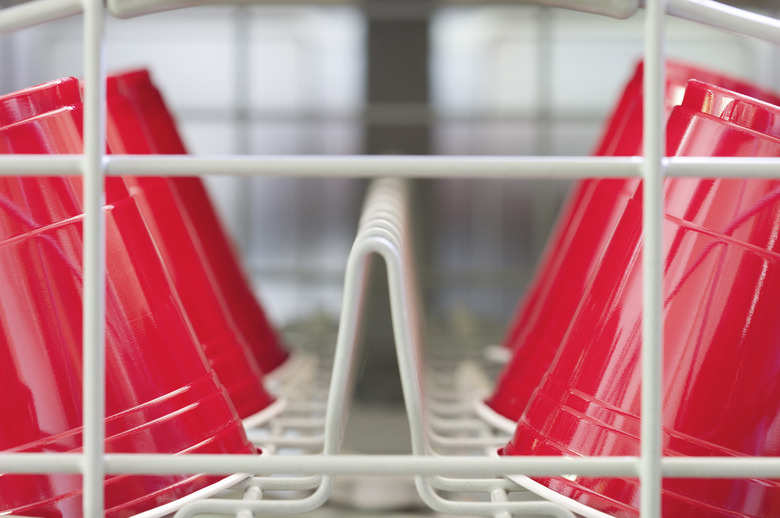Can You Wash Plastic Cups In A Dishwasher?
We may receive a commission on purchases made from links.
The safety of using certain plastics in food preparation and serving came under scrutiny in recent years, and the topic has remained controversial. If you know which type of plastic kitchen cups you have and how to wash them safely, you'll have few concerns about loading them into your dishwasher.
Tip
You should identify what type of plastic your dishes are made of before washing them in the dishwasher. You should also use a non-abrasive dishwasher detergent.
The BPA Question
The BPA Question
Manufacturers make a variety of types of plastic, with only a handful appearing in food containers, including drinking cups. Those containing a chemical called bisphenol A — or BPA — receive the most scrutiny over controversial concerns that it poses a health hazard, especially to children. The chemical is a main component of polycarbonate, a durable plastic that shows up in many drinking cups, among other items.
Washing Dishes Safely
Washing Dishes Safely
Heat and strong dishwashing detergent both can degrade most plastics over time, especially those containing BPA. The Washington State Department of Health, therefore, recommends not putting plastic kitchen cups containing the chemical in a dishwasher, especially when using abrasive soap. If you're looking for a non-abrasive soap, try Cascade Free & Clear ActionPacs, a gel detergent that comes in pre-measured packets. Consumer Reports rates it as excellent for cleaning and preventing water film.
Besides using the right detergent, it's also important to use your dishwasher properly. Skip the pre-rinse, which just exposes the dishes to an extra dose of hot water, and scrape the dishes well in the sink instead. It's also important to load the dishes properly and to use a rinse aid that allows water to sheet off the dishes rather than form droplets that can leave water marks.
Dishwasher manufacturers also discourage putting plastic cups made for a single use in the machine to avoid health issues or melting of the container. Other plastics may stand up to washing in the machine, but check recommendations from the manufacturer and put all plastics in the top rack.
Identifying Types of Plastic
Identifying Types of Plastic
Turn every plastic cup or container over and check the recycling code for a clue about whether you can safely wash it in the high heat of a dishwasher. Those with the code PETE or PET or code No. 1 can break down over repeated washings in hot water and strong detergent, and may not stay safe.
According to Roadrunner Recycling, those with recycling code No. 5 generally contain BPA, the chemical that may leach into food and beverages, and those with numbers 7 or 3 may also contain the chemical. Those marked with code No. 6 — normally plastic foam — cannot withstand heat or strong detergent and should not be washed in the dishwasher or reused.
Discard Damaged Plastic
Discard Damaged Plastic
The use of plastics in food service and packaging, including drinking cups, remains controversial. Most manufacturers willingly stopped using BPA in the face of concerns over its possible health risks. Older pieces, however, likely still contain it, so carefully monitor plastics for damage — and discard any that cause you to suspect their safety. Keep those that cannot handle the heat out of the dishwasher.
